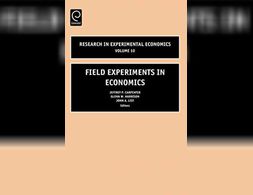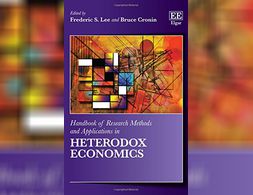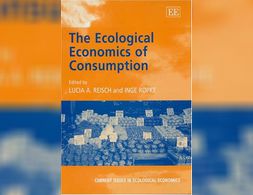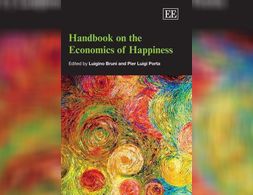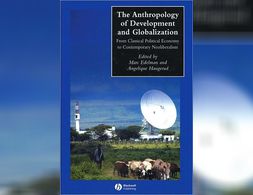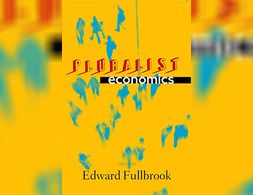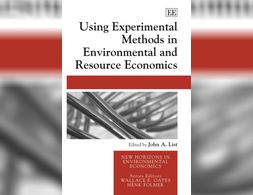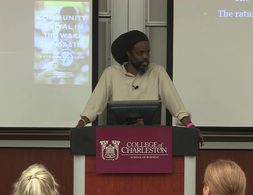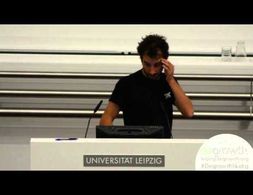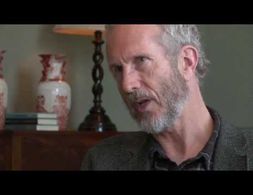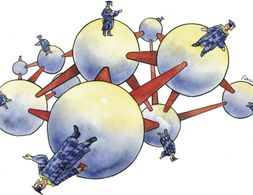✕
363 results
The goal of this brief report is to put in one place some of the works that have come out of the movement to reform economics education. True to their training, the student movement for pluralism in economics education has been marked by an impressive amount of research: both on economics education itself and on more topical subjects within economics.
Experimental economists are leaving the reservation. They are recruiting subjects in the field rather than in the classroom, using field goods rather than induced valuations, and using field context rather than abstract terminology in instructions.
From the two premises that (1) economies are complex systems and (2) the accumulation of knowledge about reality is desirable, I derive the conclusion that pluralism with regard to economic research programs is a more viable position to hold than monism. To substantiate this claim an epistemological framework of how scholars study their objects of inquiry and relate their models to reality is discussed. Furthermore, it is argued that given the current institutions of our scientific system, economics self-organizes towards a state of scientific unity. Since such a state is epistemologically inferior to a state of plurality, critical intervention is desirable.
Despite the important methodological critiques of the mainstream offered by heterodox economics, the dominant research method taught in heterodox programmes remains econometrics.
Max Krahé explains the role of economic planning for a green transition.
Mounting evidence suggests a lot of published research is false. Check out Audible: http://bit.ly/AudibleVe Support Veritasium on Patreon: http://bit.ly/VePa...
This paper starts with an evaluation of three common arguments against pluralism in economics: (1) the claim that economics is already pluralist, (2) the argument that if there was the need for greater plurality, it would emerge on its own, and (3) the assertion that pluralism means ‘anything goes’ and is thus unscientific. Pluralist responses to all three arguments are summarized. The third argument is identified to relate to a greater challenge for pluralism: an epistemological trade-off between diversity and consensus that suggests moving from a discussion about ‘pros’ and ‘cons’ towards a discussion about the adequate degree of plurality. We instantiate the trade-off by showing how it originates from two main challenges: the need to derive adequate quality criteria for a pluralist economics, and the necessity to propose strategies that ensure the communication across different research programs. The paper concludes with some strategies to meet these challenges.
If there’s one method economists have neglected the most, it’s qualitative research. Whereas economists favour mathematical models and statistics, qualitative research seeks to understand the world through intensive investigation of particular circumstances, which usually entails interviewing people directly about their experiences. While this may sound simple to quantitative types the style, purpose, context, and interpretation of an interview can vary widely. Because of this variety, I have written a longer post than usual on this topic rather than doing it a disservice. Having said that, examples of qualitative research in economics are sadly scant enough that it doesn’t warrant multiple posts. In this post I will introduce qualitative research in general with nods to several applications including the study of firm behaviour, race, Austrian economics, and health economics. More than usual I will utilise block quotes, which I feel is in the spirit of the topic.
The Philosophy of Economics Foundational Text provides a systematic and well-structured overview over the field of philosophy of economics.
In its first edition, this book helped to define the emerging field of ecological economics. This new edition surveys the field today. It incorporates all of the latest research findings and grounds economic inquiry in a more robust understanding of human needs and behavior.
Research on consumption from an environmental perspective has exploded since the late 1990s. This important new volume cuts across disciplines to present the latest research in the field. The book is divided into three parts, the first of which addresses the problems of consumption both as a concept and as an economic and social force with high environmental impact.
The MINE website explores the interplay between nature and economy. Focusing on such fundamental concepts as time, thermodynamics, evolution, homo politicus and justice, a new outline of economic activity emerges within nature. The dominant approach of Mainstream Economics, which considers nature as a subsystem of the economy, is thus replaced by a broader and more integrated framework. The visual map and its links between concepts provides an orientation. The visitor can approach the content from their own starting point and follow their own path to discovery. Each concept starts with the historical background and moves on through theory and practice.
The research behind MINE began in the 1970s at the University of Heidelberg, Germany, in an interdisciplinary group spearheaded by Professor Malte Faber, including scientists from economics to mathematics, physics and philosophy. The research has contributed to the field of Ecological Economics.
MINE is directed at students, scientists and decion-makers. More on http://nature-economy.de/faq/
We collect selected high quality working papers from the leading international universities and research institutes in the field of plural and heterodox economics. The working papers in our selection present economic schools of thought and debates in a first-class way and give an insight into the latest research.
By conducting a discourse analysis (SKAD) in the field of academic economics textbooks, this paper aims at reconstructing frames and identity options offered to undergraduate students relating to the questions ‘Why study economics?’ and ‘Who do I become by studying economics?’. The analysis showed three major frames and respective identity offerings, all of which are contextualized theoretically, with prominent reference to the Foucauldian reflection of the science of Political Economy. Surprisingly, none of them encourages the student to think critically, as could have been expected in a pedagogical context. Taken together, economics textbooks appear as a “total structure of actions brought to bear upon possible action” (Foucault), therefore, as a genuine example of Foucauldian power structures.
The global financial crisis (GFC) led to increasing distrust in economic research and the economics profession, in the process of which the current state of economics and economic education in particular were heavily criticized. Against this background we conducted a study with undergraduate students of economics in order to capture their view of economic education.
This book is a welcome consolidation and extension of the recent expanding debates on happiness and economics. Happiness and economics, as a new field for research, is now of pivotal interest particularly to welfare economists and psychologists. This Handbook provides an unprecedented forum for discussion of the economic issues relating to happiness.
The Anthropology of Development and Globalization is a collection of readings that provides an unprecedented overview of this field that ranges from the field?s classical origins to today?s debates about the ?magic? of the free market.
The investigative research conducted by the German weekly newspaper "Die Zeit" and the British Daily Newspaper "The Guardian" includes a research-based critique of carbon trading.
Teaching feminist economics is a relatively new didactical project posing questions of content and methodology for instructors. The article proposes three possible topics with regard to the changing nature of the emergent research field: introducing feminist economics as a mode of questioning, showing its historicity and spectrum, and asking the question of a unifying paradigm.
This book is an authoritative and accessible guide to the pluralist movement threatening to revolutionise mainstream economics. Leading figures in the field explain why pluralism is a required virtue in economics, how it came to be blocked and what it means for the way we think about, research and teach economics.
This book explores frontier work at the intersection of experimental and environmental economics, with cutting edge research provided by premier scholars in the field.The book begins by focusing on improving benefit-cost analysis, which remains the hallmark of public policy decision-making around the globe.
The world has changed dramatically in recent years and so has the field of economics, but many introductory economics textbooks have remained stuck in the past. This book provides a new beginning for the study of macroeconomics, fundamentally international in its approach and emphasizing current debates and research trends.
The Routledge Handbook of Feminist Economics presents a comprehensive overview of the contributions of feminist economics to the discipline of economics and beyond. Each chapter situates the topic within the history of the field, reflects upon current debates, and looks forward to identify cutting-edge research. Consistent with feminist economics' goal of strong objectivity, this Handbook compiles contributions from different traditions in feminist economics (including but not limited to Marxian political economy, institutionalist economics, ecological economics and neoclassical economics) and from different disciplines (such as economics, philosophy and political science). The Handbook delineates the social provisioning methodology and highlights its insights for the development of feminist economics. The contributors are a diverse mix of established and rising scholars of feminist economics from around the globe who skilfully frame the current state and future direction of feminist economic scholarship. This carefully crafted volume will be an essential resource for researchers and instructors of feminist economics.
In this talk, Virgil Henry Storr, a Research Associate Professor of Economics in the Department of Economics at George Mason University, talks about his research into to post-disaster recovery and the role that social entrepreneurship plays in rebuilding the communities and social networks that get disrupted, or entirely eliminated.
A historical glimpse of how economists of the 19th century debated the usefulness of mathematics to economics
Behavioural economics deals with observing behaviour and economic decision making behaviour.
This is a recording of an introductory course held at the 4th International Degrowth Conference for Ecological Sustainability and Social Equity in Leipzig in 2014. Federico Demaria from the French-Spanish organisation Research and Degrowth gives an introduction to degrowth. The presentation is based on the introduction to the book “Degrowth. A vocabulary for a new era.” and discusses definitions of degrowth, degrowth literature, debates, history and further research to be done.
Based on a critique on econometric and DSGE models (in particular in the context of the financial crisis), Doyne Farmer presents his current research programme that aims at building an agent-based model of the financial and economic crisis. It models heterogeneous agents and from there simulates the economy, firstly for the housing market. The interview gives a short insight in the research programme.
On this episode of the Hayek Program Podcast, Professor Roger Koppl talks with Hayek Program Research Fellow Solomon Stein about his research on experts, evolution, and the dynamics of epistemics, his career, and in what future direction(s) he thinks Austrian economics will go.
Steven G. Medema is a Research Professor at Duke University. His research focuses on the History of Economic Thought, having published extensively on the issue of social costs of production (conceptualized as externalities in neoclassical economics). In this recorded seminar, he exposes his working paper on the history of the concept of externalities in economic literature, starting from Pigou’s “The Economics of Welfare” (1920), where Pigou makes the case for governmental intervention in the market where there is a divergence between private and social costs or benefits of a productive activity. T
Institutional economics focuses on the role of social institutions in terms of laws or contracts, but also those of social norms and patterns of human behaviour that are connected to the social organisation of production, distribution and consumption in the economy.
"Ecological economics is an exciting interdisciplinary field of study that combines insights from the natural sciences, economics, philosophy and other fields to develop innovative approaches to environmental problems.
We use cookies on our website. Click on Accept to help us to make Exploring Economics constantly better!


